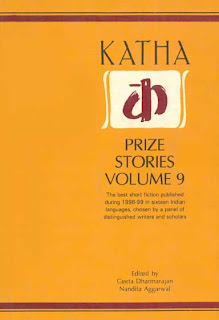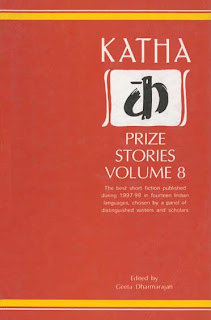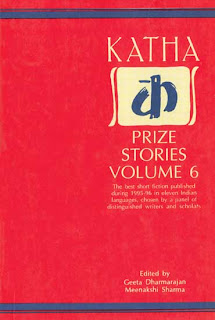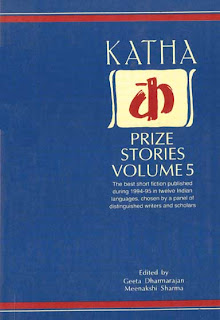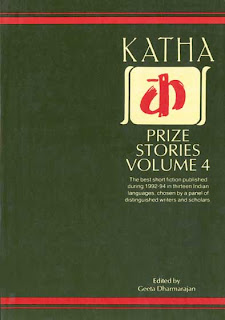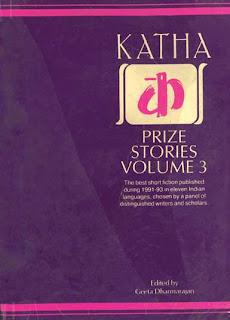As varied as variety itself, this collection brings to you trenchant, very Indian fictions that explore personal joys and sorrows, friendships and alienations, the everyday tenderness and harshness of life. This is a compelling collection of sixteen stories from Asomiya, Bangla, English, Gujarati, Hindi, Kannada, Malayalam, Oriya, Punjabi, Rajasthani, Tamil, and Urdu.
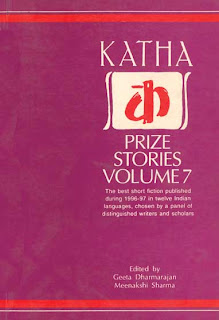
Biblio
(March - April 1998)
… worthy additions to what is fast becoming a rich store of Indian literature in translation.
With Katha Prize Stories Volume 7, Katha continues its diligent dismantling of the barriers between “mainstream” and “regional” literature in India ... the stories in Volume 7 are thought provoking and imaginative, and a few sparkle especially bright.
– Latha Anantharaman
The Hindustan Times
(October 24, 1998)
Painstakingly selected by a jury of distinguished writers and scholars, it shows evidence of having been subsequently edited with love and diligence. This makes the volume a rare intellectual and emotional treat. Indeed, this volume comes as yet another proof of the fact that Katha has become a dependable deliverer of the best short fiction from India in the various languages every year.
The collection embraces a wide variety of concerns endeavouring to unveil hidden depths of the human mind. Couching this volume are brief biographical entries on the writers with sensitive insights into the responses of both the writer and the translator to the story. This makes the volume a worthwhile peek into the “backstage” of the immensely fecund world of literary creation in the bhashas. More than anything else, the Katha awards and their publication thus, encourage a participative impulse in the reader, involving him in the search for the best. This is, once again, a reminder that there is no dearth of raw material for creativity in India and also that there is abundant talent waiting to tap it. Though rooted in different linguistic spheres, these stories do not merely celebrate the local and the particular. Rather, invigorated by the vitality that these roots give, they successfully deal with common human preoccupations and predilections, nudging the reader to turn his eye both inward and outward.
Indian Review of Books
(April 16 – May 15 1998)
Crowded With Talent
Katha has done it again, has presented for our delectation a stimulating selection of stylish Indian fiction translated into English … it’s Brilliant. Sixteen excellent translations of memorable stories packed tightly in a magenta overcoat.
I have to admit that almost all the stories are favourites for different reasons. A grand collection indeed. The translators have obviously laboured with love. Their work is admirable, sensitive, evocative and subtly nuanced as I’m sure the originals are. Katha deserves a round of applause for continuing to give writers in Indian languages much-needed exposure, unearthing a cache of talented translators and revealing the wealth and diversity of literature that lies hidden and unappreciated in this amazing land of ours.
–Jaya Banerji
The Statesman
(Monday, February 9, 1998)
All the stories in this collection are representative of the wide diversity of Indian cultures, habits and customs and reveal the depth of talent available in our country. Katha’s attempt to showcase this talent is laudable.
The Telegraph
(January 2, 1998)
Katha Prize Stories Volume 7 edited by Geeta Dharmarajan and Meenakshi Sharma continues one of the most important publishing initiatives in recent years ... The volume is superbly produced, which makes it a welcome change from the unattractive get up of most books of translation in the country. The writers featured in the collection includes such established names as Prem Prakash, Vaidehi and Baldev Singh while newer talents include Nazir Mansuri, Brinda Charry and Phul Goswami. Another significant feature of this volume is the dominance of women writers. Something for Mr Rushdie to mull over perhaps.
Economic Times
(Sunday, February 8, 1998)
… Katha has commendably applied the mountain-will-come-to-Mohammed adage to bring the richness of India's literature to English habitues, in a manner uniquely its own. That is, sensitive translations of representative fiction writing in regional languages … Katha Prize Stories Volume 7 continues the task of keeping India in touch with itself via the creativity of its contemporary short story writers.
For the most part, taken together the curiously timely yet timeless tales paint a mesmerising picture of India in her awesome diversity, reflected in the varied concerns of her people.
So, each story is a brush stroke.
Bookworm
(August 1998)
“The Whale” by Nazir Mansuri (Volume 7), for instance, has been translated with such finesse from the Gujarati by Nikhil Khandekar – and it must have been a ferociously difficult task, given the fact that the whole story depends upon its descriptions of the locale for its effectiveness, and the locale is pretty specialized – that is difficult to believe that it wasn’t written in English. Katha also considers fiction originally written in English and Volume 7 contains one of the best specimens that I have read for some time, “The Sisters,” written by Brinda Charry ... And to think we would have never got to read any of them, if it wasn’t for Katha. But the far bigger tragedy? We wouldn’t have known what we were missing.
The Week
(February 22, 1998)
Katha’s collection of short stories are a treasure, once again...
Each annual volume is a collector’s item bringing together, within the pages of a single publication, English translations of the best short fiction of the previous year in all the major Indian languages.
It used to be said that Indian language writing translations could never adequately capture the quality and spirit of the original. Year after year Katha has been triumphantly proving this proposition wrong. The boom in the last few years in English translations of Indian fiction – all the big names in Indian publishing have got into the act – owes much to Katha’s trail blazing effort.
In making Indian short fiction accessible to Indians themselves, in enabling literary enthusiasts in each language region to discover what their counterparts in other parts of the country are currently reading and writing about, Katha’s contribution is invaluable.
And, unlike almost all the other publishing houses where the quality of releases have fluctuated wildly, Katha has shown impeccable taste. Both in its choice of stories and in the quality of its translations, it has consistently upheld high standards ... all manage to convey what is essential for a good translation: the flavour of the original ...“Topi” ... is one of the finest stories I’ve read in my life.
India Today
(January 26, 1998)
Sound, phonetically aflame English translations have become the distinguishing trait of the Katha series. This volume doesn’t disappoint. The rich and vital sounds, dialects and peculiar flavours of various regions are astutely preserved ... the gifted raconteurs seem wholly clued into the grammar of gripping fiction ...
The absence of literary ornamentation and the gratifying synthesis of emotion and expression characterize almost all the introspective stories about loss and restoration.
The Express Magazine
(February 8,1998)
The Katha volumes are an accessible celebration of the Indian experience in all its diversity
… And one thing that the Katha series can always be commended for is its faithful adherence to the original text ...
Katha has several other achievements, the most important one being the cultivation of a whole new readership for translations of contemporary short stories drawn every year from Indian languages. Which is affirmed by the fact that each of the six previous volumes is into reprints ...
... Katha has filled a huge vacuum ... As the noted Hindi litterateur Bhisham Sahni pointed out while releasing the present volume, “Translations are vital for any meaningful study of literature, for there’s a limit to the number of languages you can learn.”
... the present volume, too, is a medley of voices, all distinct and complementary to each other. Katha is a celebration of the diversity of the Indian experience. If Brinda Charry’s “Sisters” sounds real, it is only because this is a refreshing Indian story with a very Indian use of the English language. It has been presented with its original sounds intact ...
“Sheesha Ghat,” Naiyer Masud’s disturbing tale of critical handicaps, for instance, yields as much meaning as the reader infuses into it. It must surely have been one of the most difficult stories to translate. Not that the others are any easier to reproduce. Sanjay Sahay’s brilliantly detailed Hindi short story about the corrupting influence of authority in Bihar, “Topi,” Khalid Javed’s poignant Urdu tale “Bure Mausam Mein”, which appears as the “Season of Fever”; Phul Goswami’s revealing study of contemporary Assam, “Co-Travellers” (“Sahajatri”); and Nazir Mansuri’s innovative Gujarati tale about the fishing community, “Bhuthar” (“The Whale”), must all have been a translator’s nightmare. But most of them have done well enough to be able to communicate the distinct richness of the voices of different regions.
Considering that the collection opens up to most of its reader’s worlds that wouldn’t otherwise exist for them, the publication of each Katha volume is a happy event. And as Bhisham Sahni would readily testify, the readers are the richer for it.
– Ashish Sharma
Business Standard
(Tuesday, February 3, 1998)
Katha has been consistently bringing the latest in Indian fiction. Katha Prize Stories Volume 7 ... carries this tradition forward ... Each story describes a different world, yet speaks of something universal. They draw heavily from immediate surroundings for both the setting and the imagery, which gives them a very Indian flavour. At the same time, they present a view of what lies beyond the apparent. They are like excerpts from life, magnified to allow the intricacies to come through. Together, the kaleidoscopic view of these “worlds” brings home the concept we know as India.
The translations ... have done justice to the original works. They keep the “untranslatable” untranslated, retaining the story’s original flavour.
... Katha offers a window to the contemporary literature scene in the country, and peeping, which has always been tempting, here actually proves exciting.
– Paritosh Bansal
The Pioneer
(Saturday, January 8, 1998)
Katha has done more for Indian writing in translation than what has been achieved by the efforts of Sahitya Kala Akademi and other such Government aided bodies put together. The December compilation of the “best short fiction published” during the year has become a much- awaited annual literary event ...
Katha definitely has carved a niche for itself in the West, more specifically certain Universities abroad where it has been included as primary reading in their syllabi. Such popularity can, however, be counterproductive. Indian readers exiled from the vernacular tradition can do without any souped-up version of what constitutes “Indian writing.” It needs to be added that these apprehensions are not founded on material fact, and the present collection bears testimony to the rigorous and fair selection procedure followed by Katha.
The sixteen stories that adorn Katha 7 highlights the freedom “mother-tongue” writers enjoy over Indian writers writing in English. There is no conscious effort to “root” their narratives on a self-consciously created Indian milieu. There is therefore, in their writing, a quality of universal reference … And yet, this universal quality filters out of a consciousness that is local and rooted. Which explains the recurring motifs of poverty, loneliness of women, disaffection with the system, family relations, etc. Both these features – universality and local consciousness – counterpoise each other in helping the collection escape trite generalizations.
Naiyer Masud’s “Sheesha Ghat” is possibly the most difficult in the selection. Along with “The Whale,” it is among the more symbolic and complex of these stories. Created with a great lyrical quality that is preserved in translation, there is a haunting, almost magical balance in the tale, especially in the interplay of symbols and in the interaction between extraordinary characters.
Over all, Katha 7 impresses. If you like reading quality fiction, you can read it without apologizing for not being able to read the original. The translations are quality, non niche efforts, with Katha doing what it does without compromising integrity for regional and such like considerations. Readers of Katha 7 will eagerly await Katha 8.
– Debraj Mookerjee
The Hindustan Times
(Sunday Magazine, October 25, 1997)
Katha Prize Stories Volume 7 ... comes as yet another proof that Katha has become a dependable deliverer of the best short fiction from India in the various Indian languages every year. The collection embraces a wide variety of concerns endeavouring to unveil hidden depths of the human mind.
–Meenakshi Bharat
The Authors
Ashita
Baldev Singh
Brinda Charry
B Chandrika
Khalid Jawed
Nayyar Masood
Nazir Mansuri
Paavannan
Phul Goswami
Prem Parkash
Ram Swaroop Kisan
Sanjay Sahay
Suchitra Bhattacharya
Tarun Kanti Mishra
Vaidehi
Che Yoganathan
The Translators
Mridula Nath
Chakraborty
B Chandrika
Devinder Kaur Assa Singh
Elizabeth Bell
Indira Chandrasekhar
Jasjit Mansingh
Jatindra Kumar Nayak
N Kalyan Raman
N Kamala
Maozzam Sheikh
Nikhil Khandekar
Pradipta Borgohain
Pranava Manjari N
G J V Prasad
Reema Anand
Shama Futehally
Shyam Mathur
Zakir Zaheer
The Nominating Editors & Journals
Assamese: Indira Goswami (Prantik)
Bangla: Shirshendu Chakravarti (Desh)
English: Ananda Lal
Gujarati: Ganesh Devy (Gadyaparva)
Hindi: Asad Zaidi (Hans)
Kannada: Shantinath K Desai (Udayavani)
Malayalam: Paul Zacharia (Malayala Manorama, Mathrubhumi Daily)
Oriya: Yashodara Mishra (Jhunkara)
Tamil: R Chudamani (Dinamani Kathir, India Today)
Urdu: Sara Rai (Soughat, Shabkhoon)
Punjabi: Kartar Singh Duggal (Aarsee)
Rajasthani: Vijayadan Detha (Jagati Jot)
Edited by
Geeta Dharmarajan
Meenakshi Sharma
Publishers: Katha
Cover Design: Taposhi Ghoshal
Colours: Arvinder Chawla
Logo Design: Crowquill
Category: Katha Prize Stories
Statistics: 5.5" x 8" 224 pages
ISBN 81-85586-74-8 [PB]
Price: Rs 250 [India and the subcontinent only]
